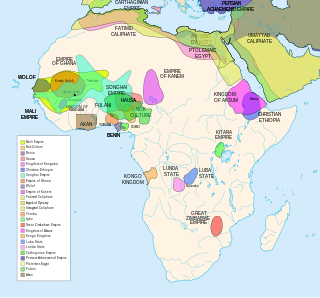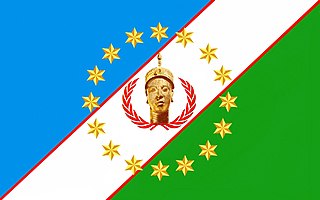
Oduduwa was a Yoruba divine king, legendary founder of the Ife Empire and a creator deity (orisha) in the Yoruba religion. His earthly origins are from the village of Oke Ora According to tradition, he was the holder of the title of the Olofin of Ile-Ife, the Yoruba holy city. He ruled briefly in Ife, and also served as the progenitor of a number of independent royal dynasties in Yorubaland.

Ifẹ̀ is an ancient Yoruba city in south-western Nigeria, founded approximately between the 1000 BC and 600 BC. The city is located in present-day Osun State. Ifẹ̀ is about 218 kilometers northeast of Lagos with a population of over 500,000 people, which is the highest in Osun State according to population census of 2006.
Iwo is a city in Osun State, Nigeria. The Iwo people, like all other people of the Yoruba kingdom, are said to have originated from Ile-Ife, where they migrated sometimes in the 11th century according to Alademomi kenyon and Prince Adelegan Adegbola (2009). The only predicted land with the symbol of the parrots is the Iwo kingdom. The city was formerly part of old Oyo state and was later separated and became one of the major townships in Osun State, Nigeria.

The Oyo Empire was a Yoruba empire in West Africa. It was located in present-day southern Benin and western Nigeria. The empire grew to become the largest Yoruba-speaking state through the organizational and administrative efforts of the Yoruba people, trade, as well as the military use of cavalry. The Oyo Empire was one of the most politically important states in Western Africa from the mid-17th to the late 18th century and held sway not only over most of the other kingdoms in Yorubaland, but also over nearby African states, notably the Fon Kingdom of Dahomey in the modern Republic of Benin on its west.
Ketu is the name of a Yoruba subgroup, historical kingdom and region straddling parts of what is now southeastern Republic of Benin and parts of southwest Nigeria. The chief town and traditional capital of the area was the town of Kétou (Kétu), which is considered to be one of the oldest capitals of the Yoruba-speaking people, tracing its establishment to a settlement founded by a descendant of Oduduwa called Sopasan or Soipasan. The Oba of the town were traditionally styled "Alákétu", and are related directly to Ile-Ife in present-day Nigeria. Other towns that were historically part of the Kétu Kingdom are;

Osun State, occasionally known as the State of Osun by the state government, is a state in southwestern Nigeria; bounded to the east by Ekiti and Ondo states for 84 km and for 78 km respectively, to the north by Kwara State for 73 km, to the south by Ogun State for 84 km and to the west by Oyo State, mostly across the River Osun. Named for the River Osun—a vital river which flows through the state—the state was formed from the southeast of Oyo State on 27 August 1991 and has its capital as the city of Osogbo.
The Ijesha are a sub-ethnicity of the Yorubas of West Africa. Ilesha is the largest town and historic cultural capital of the Ijesha people, and is home to a kingdom of the same name, ruled by an Oba locally styled as the Owa Obokun Adimula.The present ruling family of ijesha is the Aromolaran family with the current reigning Owa Obokun being Oba Gabriel Adekunle Aromolaran.

The Legends of Africa reflect a wide-ranging series of kings, queens, chiefs and other leaders from across the African continent including Mali, Benin, Ghana, Nigeria, Congo, Ethiopia, Eritrea and South Africa.

The history of Nigeria before 1500 has been divided into its prehistory, Iron Age, and flourishing of its kingdoms and states. Acheulean tool-using archaic humans may have dwelled throughout West Africa since at least between 780,000 BP and 126,000 BP. Middle Stone Age West Africans likely dwelled continuously in West Africa between MIS 4 and MIS 2, and Iho Eleru people persisted at Iho Eleru as late as 13,000 BP. West African hunter-gatherers occupied western Central Africa earlier than 32,000 BP, dwelled throughout coastal West Africa by 12,000 BP, and migrated northward between 12,000 BP and 8000 BP as far as Mali, Burkina Faso, and Mauritania. The Dufuna canoe, a dugout canoe found in northern Nigeria has been dated to around 6556-6388 BCE and 6164-6005 BCE, making it the oldest known boat in Africa and the second oldest worldwide.

The documented history begins when Oranyan came to rule the Oyo Empire, which became dominant in the early 17th century. The older traditions of the formerly dominant Ile-Ife kingdom are largely oral.

African empires is an umbrella term used in African studies to refer to a number of pre-colonial African kingdoms in Africa with multinational structures incorporating various populations and polities into a single entity, usually through conquest.

The Yoruba of West Africa are responsible for a distinct artistic tradition in Africa, a tradition that remains vital and influential today.

The Yoruba people are a West African ethnic group who mainly inhabit parts of Nigeria, Benin, and Togo. The areas of these countries primarily inhabited by the Yoruba are often collectively referred to as Yorubaland. The Yoruba constitute more than 50 million people in Africa, are over a million outside the continent, and bear further representation among members of the African diaspora. The vast majority of the Yoruba population is today within the country of Nigeria, where they make up 20.7% of the country's population according to Ethnologue estimations, making them one of the largest ethnic groups in Africa. Most Yoruba people speak the Yoruba language, which is the Niger-Congo language with the largest number of native or L1 speakers.
The Owu sub-ethnicity is a part of the Yoruba people of West Africa. Ago-Owu in Abeokuta is where the Owus are mostly concentrated, however large Owu settlements are found throughout Yorubaland. The Yoruba confederacy of kingdoms extends beyond the boundaries of Nigeria into the Republic of Benin and Togo.

The Akure Kingdom is a traditional state with headquarters in Akure, Ondo State, Nigeria. It is the successor to an ancient Yoruba city state of the same name. The ruler bears the title "Deji of Akure".
The Ondo Kingdom is a traditional state that traces its origins back for over 500 years, with its capital in Ode Ondo. Ondo Kingdom was established by Princess Pupupu, one of the twins of Alafin Oluaso. Her mother was Queen Olu who later died at Ile oluji. There were wars in the town between 1865 and 1885 when people in the kingdom fled to Oke Opa. Three Osemawes were installed and died there. Before then the kingdom was ruled by the son of Pupupu called Airo.
Ọba Timi Abibu Sàngólámì (Ọ)Lágúnjú was a Yoruba monarch of the town of Ede, and leader in the 19th century. He was the first Muslim Timi that Ede produced, he also belonged to the first generation of Yoruba Muslims who held high political office in the pre-colonial era and who used their positions to enhance the growth of his town, Ede and his religion, Islam. Indeed, Abibu Lagunju was the second Muslim Oba in Yorubaland given the fact that he was already on the throne for a couple of years when, in November 1857, the American Baptist Missionary, Reverend W.H. Clarke, visited Ede.
This is a list of the royal titles of Yoruba monarchs. It is not in the order of seniority.
Ooni Lúwo Gbàgìdá was the 21st Ooni of Ife, a paramount traditional ruler of Ile Ife, the ancestral home of the Yorubas in the 10th century.

The Ife Empire was the first empire in Yoruba history. It was founded in what is now southwestern Nigeria and eastern Benin. The Ife Empire lasted from 1200 to 1420. The empire was formed by Odùduwà, and became well-known for its sophisticated art pieces. Although Yoruba was the main language of the empire, there were also various spoken dialects and languages. It rose to power through trade with Sahelian and forest states. Its capital city, Ilé-Ife, was one of the largest urban centers in 14th century West Africa.












